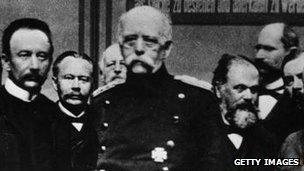Is redistribution a foreign idea to the US?
- Published
- comments

Bismarck was known as a man of war, but he also redistributed wealth
Mitt Romney, in the wake of his "47%" comments, told Fox News, external that government redistribution of wealth is an "entirely foreign concept" to Americans.
He repeated the point today: "I know there are some who believe that if you simply take from some and give to others then we'll all be better off. It's known as redistribution. It's never been a characteristic of America."
I am not sure whether Mr Romney means that such ideas come from abroad or just that redistribution is alien to American values.
But he is on to something.
A 'flatter tax'
Despite being factually wrong, he has hit upon a central reason why American politics can seem so very different to what happens in Europe, including in Britain. Specifically, conservatism here is very different from conservatism there.
There is a large section of the American right, indeed of the American people, which does not accept the grand central bargain of post-war politics across the other side of the Atlantic.
The Republican candidate of course protests too much. In a technical sense, any system of taxation involves a redistribution of wealth, from the individual to where the government chooses to spend it.
Of course, hundreds of years ago it was distributing the wealth of the masses upwards to the kings and lords. But nowadays, even if every citizen paid exactly the same in a minimalist state there would still be redistribution to defence manufacturers, or to the police force, or whatever.
That is perhaps a technical point. But Mr Romney himself hasn't always rejected redistribution in a more classic sense.
He has opposed the idea of a flat tax, external, which means whatever your income, you pay the same percentage of tax, although he does support a "flatter tax".
America has a progressive tax system - the rich pay more than the middle classes, who pay more than the poor. Mr Romney talks about, external "fairness" and "bringing down" marginal rates, but not about eliminating the principle.
Bismarck's New Deal
But he is right that in America has only slowly embraced anything that looks like redistribution of wealth. After all it was that arch-reactionary, Otto von Bismarck, who introduced the world's first welfare system, external, including the old-age pension, in Germany in the 1860s.
America didn't get anything like it until Franklin Roosevelt - FDR - brought in the New Deal, including a pension for the poorest in 1935, external.
Maybe it is something about presidents with three initials, but the real expansion of redistribution came with LBJ's Great Society, external.
Richard Nixon built on this, but many conservatives have never accepted the changes.
This is in contrast to Europe, where both main political traditions after World War II seemed to broadly agree that while Soviet Union-style socialism didn't work, capitalism if left to its own devices produced inequalities which if not softened could prove dangerous.
In 1950s Britain this agreement around the welfare state was pronounced enough to be given the mocking label "Butskellism", a combination of the names, external of leading Conservative and Labour politicians of the time.
The Iron Lady, Mrs Thatcher, was widely seen to have smashed this cosy consensus, but in fact left the National Health Service, the unemployment benefit, and many other welfare provisions, if not unscathed, still standing.
There has never really been the equivalent in the United States.
While America certainly does have some redistribution of wealth via taxation, many on the right have always been vehemently opposed.
Until a few months ago it was a core part of Mitt Romney's argument that President Barack Obama was leading the US towards a "European-style entitlement society".
The Tea Party stands for "taxed enough already", but it was given life by one man's revulsion, external at the Obama administration's financial help for home owners who couldn't pay their mortgages - a classic redistribution of wealth.
What about you? Do you think redistribution is foreign to the US, or intrinsic to the American Dream?
I'm interested in your considered thoughts on the subject - but keep them civil, please. No tired abuse of those you see as opponents.